| Attractions |
|
Mahatma Jyotiba Phule Market (Crawford Market) |
|
A busy market area, this is best visited early on in the day. The fruits and
vegetable section offers the best of produce. Depending on when you visit, the
fruit/s of the season are always a good buy. |
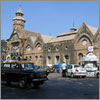 |
|
Chhatrapati Shivaji Terminus (Victoria Terminus) |
| This is a
magnificent building, and considered to be architecturally one of the finest
stations in the world. Built by the British in 1888, it has exquisite
ornamentation on its facade along with beautifully executed panels and friezes.
It holds the statue of Queen Victoria on its dome.
More... |
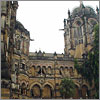 |
|
Global Vipassana Pagoda |
| Global Vipassana Pagoda is the World's Largest Pillar-less dome with a capacity to seat 8,000 meditators. In it are also enshrined Buddha's genuine relics, thus becoming the first such pagoda in India after King Ashoka's era.
More... |
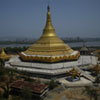 |
| Flora Fountain and the
Gothic/Victorian buildings of the Fort Area |
|
The Flora Fountain stands on the site of the old church gate of the Bombay
Fort, now a major crossroad named Hutatma Chowk. It was erected to honour Sir
Bartle Frere, a former governor of Bombay and named after the Greek goddess
Flora. Other buildings to see in |
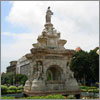 |
| the Fountain or Fort area are the University
of Mumbai buildings including the imposing Rajabhai Tower, the Mumbai High
Court, the Old Secretariat, and the Institute of Science on one end. Close by
are situated St Thomas Cathedral, the Asiatic Society of Bombay or Town Hall,
the Office of the Director General of Police, the General Post Office and the
Thomas Cook building. |
| The Western Railway
Headquarters is also quite near, across the street from the Churchgate Station.
These buildings are fine examples of the Gothic and Indo-Saracenic style. Many
are illuminated by night. An exotic way of seeing these sights would be by the
MTDC open-air bus or by the few surviving Victorias or buggy rides. Close by to
Flora Fountain is the Kala Ghoda area which holds a once a week fair (every
Sunday) from November to January. |
| Jehangir Art Gallery |
|
Close by to the Prince of Wales Museum, this gallery is the showcase for
contemporary art. The displays change regularly. Outside is the Artist's Plaza
with more paintings on display and sale. Open daily from 11 am to 7 pm. |
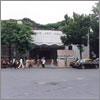 |
| Prince of Wales Museum |
| This is one of Mumbai's finest example of Victorian
architecture. Built to commemorate King George V's visit to Mumbai (while still
Prince of Wales), it was designed by George Wittet and completed in 1923. It is |
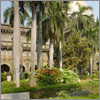 |
| undoubtedly one of India's finest museums and houses treasures, artefacts,
paintings and sculpture from the many periods covering India's history,
including the Indus Valley Civilization. Open from Tuesday to Sunday,
10.30 am to 6 pm. |
|
National Gallery of Modern Art (NGMA) |
| This is the former Cowasji
Jehangir Hall, of the Institute of Science. It has been renovated to serve as a
four-storey exhibition hall, displaying the best of Indian contemporary art.
Open daily except Monday, from 10 am to 5 pm. |
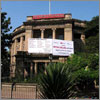 |
| Gateway of India
|
|
Mumbai's most striking monument, this too was designed by George Wittet. It has
an imposing gateway arch in the Indo-Saracenic style with Gujarati and Islamic
elements such as wooden carvings. It was built to commemorate the visit |
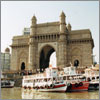 |
| of King
George V and Queen Mary to India in 1911. This area is also the departing point
for ferries plying to Elephanta Island and other beaches across the port.
Behind it is the beautiful old (and new) structure of the Taj Mahal Hotel |
|
Marine Drive and Chowpatty Beach |
| This is the
stretch now known as Netaji Subhashchandra Bose Road with Nariman Point on one
end to Babulnath, at the foot of Walkeshwar on the other. For the most part, a
pleasant promenade continues along the beach |
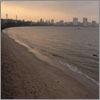 |
| with the Chowpatty area situated
somewhat in the middle. Chowpatty Beach is a teeming
mass of people, vendors, masseurs and roadside restaurants with its specialties
being bhelpuri and kulfi. Across the Chowpatty Beach area is the Taraporewala
Aquarium. Marine Drive is also referred to as the Queen's Necklace because of
the dramatic line of street lamps lit up at night. |
| Malabar Hill |
| This is essentially an up-market residential area
with some spectacular views of the city surroundings. On the road climbing up,
is a Jain temple dedicated to Adinath, the first Jain tirthankara. At one end,
on the top are the |
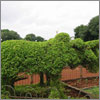 |
| Hanging Gardens (Pherozeshah Mehta Gardens) and the Kamala
Nehru Park. Both provide relaxing atmospheres of greenery. Beside the Hanging
Gardens are the Parsi Towers of Silence. But these are off-limits to all except
those who have come to dispose and pay respect to the dead. |
| Towards the other end is the Banganga
temple complex at Walkeshwar, considered to be one of Mumbai's holiest sites.
Local legend has it that the Hindu god Rama rested here on his way to rescue
Sita (his wife) from Lanka. The Banganga Tank is supposedly the spot where Rama
shot his bow or bana. Further away is the British built Raj Bhavan, the
residence of the governor of Maharashtra. The Banganga Festival of Music is a
yearly highlight, and is in the month of January usually. |
| Mani Bhavan |
| This simple and charming museum was where Mahatma
Gandhi lived on his visits to Mumbai between 1917 and 1934. Gandhi's room and
belongings including his books are on display. Mani Bhavan is situated on
Laburnam Road, |
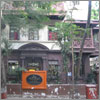 |
| near the August Kranti Maidan, where the 'Quit India' movement
was launched in 1942. Open daily from 9.30 am to 6 pm |
| Mahalaxmi Temple |
| The Mahalaxmi Temple is a popular holy site as
Mahalaxmi is the goddess of wealth. It is situated at one end of Breach Candy
-- a trendy residential and shopping area, now known as B. Desai Road. |
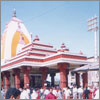 |
| Haji Ali Shrine |
| Further along the seashore, at the end of a long
pathway surrounded by seawater is the shrine dedicated to Haji Ali, a Muslim
saint. Access is only at low tide via the pathway. |
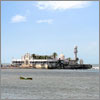 |
| Siddhivinayak Temple |
Located
in the Prabha Devi area of Mumbai, this popular temple dedicated to Ganesh was
rebuilt on the site of a 200-year old temple. Built of black stone, the idol of
Ganesh is two and a half feet in height and two feet in width. |
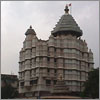 |
| An unusual
feature of the statue is that the trunk turns to the right, not often found on
Ganesh idols. Tuesday is the main day of darshan and puja,
but this temple is frequented by hundreds of devotees everyday. Click here for more details. |
|
Click here to get brief information of Siddhivinayak Temple
|
| Juhu Beach |
| This suburban beach is great favourite with
Mumbaites, and has plenty to offer everyone. Like Marine Drive's Chowpatty,
Juhu 'Chowpatty' is a vendor's delight with innumerable food counters. It is a
wonderful |
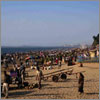 |
| place to bring kids, as it doubles up as an amusement park, play
ground, and open-air restaurant. An unusual sight at this beach is the camel
ride, which is both fun and popular. |
| RBI Musems |
| The Reserve Bank of India (RBI) is the central bank
of the country. As the central bank, it is also the custodian of the country's
monetary |
 |
| heritage. To document and preserve India's monetary history for the
posterity and as a part of the Reserve Bank's education and outreach programme
for the common man, especially the students, the Reserve Bank has conceived the
Monetary Museum. More... |